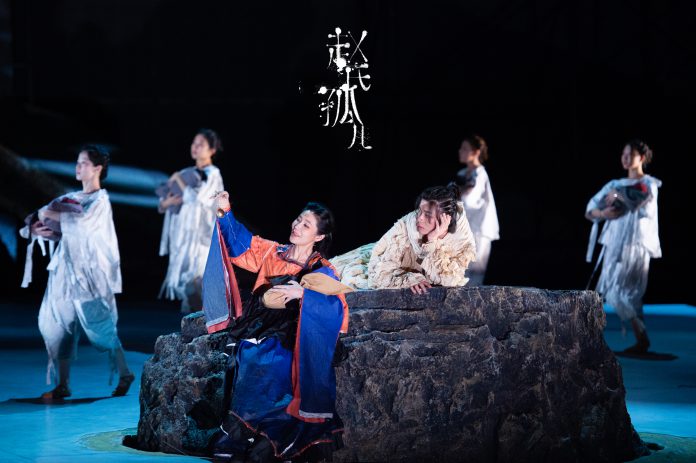Performer Angelina Zhu Zirong shares the story of her musical journey.
By Bliss Zhu
Starring in Hamlet, an adapted Chinese musical production based on Shakespeare’s classic, Zhu Zirong toured 12 cities and 21 shows around China, acting as Queen Gertrude in 2023.
“Every time I’m on the stage I go through a different life journey through music. It is amazing to perform in musicals,” the 39-year-old performer says.
She has performed in 19 different musicals including Broadway musicals. She acted as Mother and Eros in Once On An Island, and Marta in Company. She also produced the Chinese version of the Off-Broadway musical in 2021, Tick Tick Boom, which is a musical that premiered in 2001 in New York.

In recent years, Zhu participated in many original Chinese musicals such as The Orphan of Zhao(趙氏孤兒).
“Artists have little room for interpretations when performing adapted versions of foreign musicals, as they want to respect the mature original scripts. I prefer to do original Chinese musicals which give me all the space I want to perform the role with my understanding and interpretations,” she says.
Her passion for musicals can be traced back to 2003 in a singing performance at her high school. She sang so well that she won the admiration of a teacher from a musical college.
“She asked me:’ Do you want to learn musical performance?’ But actually, I did not know what it was,” she recalls.
The teacher introduced two classical musicals Les Misérables and Jesus Christ Superstar to her and she instantly fell in love with this type of art.
“I share the feelings and inner thoughts of those characters and even know the development of a whole thing from a single song,” she says.
Pursuing her love for musicals, Zhu studied at the Shanghai Conservatory Of Music between 2003 and 2008.
During that period, the musical industry in China was mainly dominated by foreign works such as Les Miserables and The Lion King, according to the China Economic Network, the largest economic information portal website in mainland China. In 2010, many companies began to produce Chinese versions of Broadway musicals.
“At that time, it was difficult to find teaching materials about musicals. When I studied musical theatre in Shanghai, I bought pirated discs of British, American, and French productions,” Zhu recalls.
Apart from listening to others’ work, Zhu also joined a band as a vocal singer. She ran for roles in many Chinese versions of Broadway and Off-Broadway musicals.
In 2017, Zhu acted in the Chinese version of Murder Ballad, an American rock musical launched in New York in 2012.
“I learnt a lot because I played two characters with completely different backgrounds and personalities. I enjoy challenging myself to perform for two roles at the same time,” she says.
To get ready for the two roles, Zhu learned from the stories and songs to know more about the characters and how to interpret the roles.

To cater to the Chinese audiences, she also studies how to change some lines in the original script and adapt them to the Chinese context.
“I discussed adaptations with the director… like how to express English slang in Chinese that resonates better with audiences,” she adds.
Zhu Zirong shares that there are so many scripts and roles she wants to play in Chinese traditional stories.
Zhu observes that more Chinese classics have been turned into musicals such as No Longer Human, The late Emperor of the Southern Tang Dynasty(南唐後主), and The Orphan of Zhao in which she had a role.
“More classical foreign musicals are introduced into the Chinese musical market after the border was reopened in post-covid, which allows Chinese artists to learn from the mature production of classics and apply them to local productions,” Zhu says.
She thinks that the commercial incentive is important for developing the Chinese musical industry.
“If production companies want more audiences to pay for their work, they need to focus on the work and script which must be well-developed with creativity,” she says.
“We can import foreign works… and I hope we can export our own creative work too. I think the Chinese musical industry will have more original productions in the coming decade for audiences around the world,” she adds.
Sub-edited by Kamun Lai







































